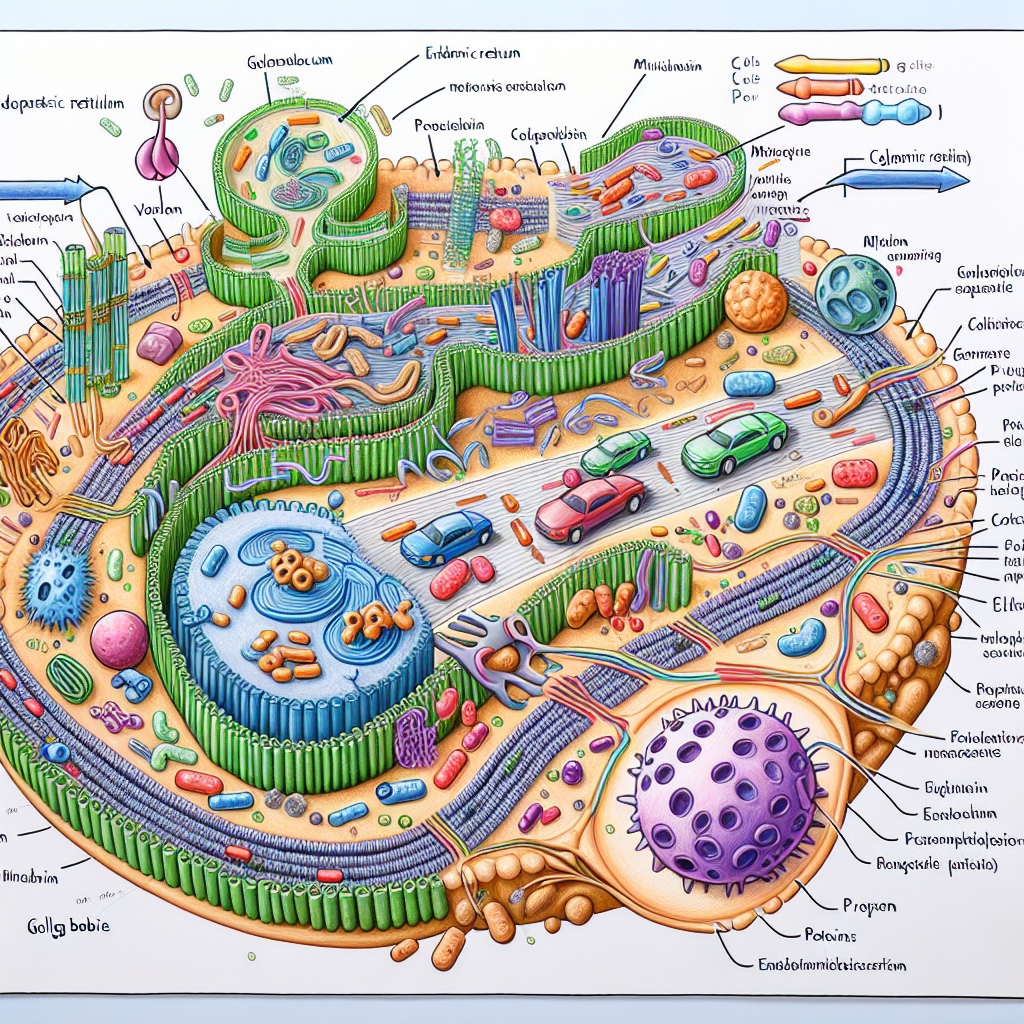Protein Trafficking: Navigating the Cellular Highway
-
Table of Contents
- Protein Trafficking: Mastering the Cellular Highway
- Understanding the Basics of Protein Trafficking
- The Signaling Pathways Guiding Protein Trafficking
- Case Studies: When Trafficking Goes Awry
- Technological Advances in Studying Protein Trafficking
- Protein Trafficking: The Implications for Therapeutics
- Conclusion: The Vital Role of Protein Trafficking
- Discover ETprotein’s High-Quality Protein Products
Protein Trafficking: Mastering the Cellular Highway

Within the bustling metropolis of a cell, proteins are the diligent workers, carrying out crucial tasks that keep the cellular city alive and functioning. But before these proteins can perform their roles, they must navigate a complex transportation network—a process known as protein trafficking. This journey is essential for maintaining cellular health and, when disrupted, can lead to a variety of diseases. In this article, we will explore the intricacies of protein trafficking, its importance, and the consequences of its malfunction.
Understanding the Basics of Protein Trafficking
Protein trafficking is the process by which proteins are synthesized, modified, and transported to their specific destinations within or outside the cell. This process ensures that proteins reach the correct location to perform their functions, which can range from catalyzing reactions to signaling and structural support.
- Synthesis: Proteins are synthesized in the ribosomes, where the genetic code from mRNA is translated into amino acid chains.
- Folding and Modification: Newly synthesized proteins are folded into their three-dimensional structures, often with the help of chaperone proteins. They may also undergo post-translational modifications, such as phosphorylation or glycosylation.
- Sorting and Transport: Proteins are then sorted and packaged into vesicles for transport. This involves the endoplasmic reticulum (ER) and the Golgi apparatus, which act as major sorting centers.
- Delivery: Finally, proteins are delivered to their destinations, which could be within the cell, such as lysosomes or the cell membrane, or outside the cell via exocytosis.
The Signaling Pathways Guiding Protein Trafficking
Protein trafficking is a highly regulated process, guided by signaling pathways that ensure precision in delivery. These pathways involve various signals, receptors, and adaptors that direct the vesicles to their target locations. For example, the presence of specific amino acid sequences, known as signal peptides, can direct a protein to the ER, marking the beginning of its journey through the secretory pathway.
Case Studies: When Trafficking Goes Awry
Disruptions in protein trafficking can lead to a range of diseases. Cystic fibrosis, for instance, is caused by a defect in the CFTR protein, which fails to reach the cell surface due to improper folding and trafficking. Similarly, Alzheimer’s disease has been linked to issues with the trafficking of amyloid precursor protein (APP), leading to the accumulation of amyloid-beta plaques.
Technological Advances in Studying Protein Trafficking
Recent technological advancements have greatly enhanced our understanding of protein trafficking. Techniques such as live-cell imaging, fluorescence microscopy, and CRISPR-Cas9 gene editing have allowed scientists to visualize and manipulate protein trafficking pathways in real-time, leading to groundbreaking discoveries.
Protein Trafficking: The Implications for Therapeutics
The study of protein trafficking has significant implications for the development of new therapeutics. By understanding how proteins are misrouted in disease, researchers can devise strategies to correct these pathways. For example, pharmacological chaperones can help stabilize misfolded proteins, allowing them to reach their proper destinations.
Conclusion: The Vital Role of Protein Trafficking
Protein trafficking is a critical process that ensures the proper functioning of cells. Disruptions in this process can lead to disease, highlighting the importance of continued research in this field. By mastering the cellular highway, scientists can develop targeted therapies to correct trafficking defects and improve human health.
Discover ETprotein’s High-Quality Protein Products
For those in the industry seeking premium protein ingredients, ETprotein offers a range of high-quality protein products. Their selection includes organic rice protein, clear rice protein, pea protein, and more, catering to various applications in food, beverage, and health products. With a commitment to non-GMO and allergen-free attributes, ETprotein stands as a reliable source for your protein needs.
About ETprotein:
ETprotein, a reputable protein Chinese factory manufacturer and supplier, is renowned for producing, stocking, exporting, and delivering the highest quality organic bulk vegan protein and plant proteins. They include Organic rice protein, clear rice protein, pea protein, clear pea protein, pumpkin seed protein, sunflower seed protein, mung bean protein, peanut protein etc. Their offerings, characterized by a neutral taste, non-GMO, allergen-free attributes, cater to a diverse range of industries. They serve nutraceutical, pharmaceutical, cosmeceutical, veterinary, as well as food and beverage finished product distributors, traders, and manufacturers across Europe, USA, Canada, Australia, Thailand, Japan, Korea, Brazil, and Chile, among others.
ETprotein specialization includes exporting and delivering tailor-made protein powder and finished nutritional supplements. Their extensive product range covers sectors like Food and Beverage, Sports Nutrition, Weight Management, Dietary Supplements, Health and Wellness Products, and Infant Formula, ensuring comprehensive solutions to meet all your protein needs.
As a trusted company by leading global food and beverage brands and Fortune 500 companies, ETprotein reinforces China’s reputation in the global arena. For more information or to sample their products, please contact them and email sales(at)ETprotein.com today.












